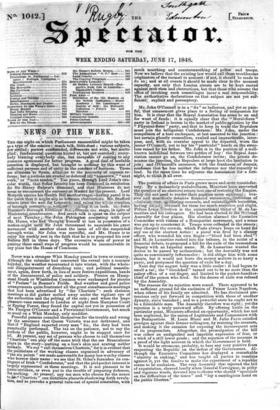The position of affairs in Paris grows more and more
unsatisfac- tory. By a melancholy maladroitness, Ministers have converted the question of an electoral return into one of restoring the Empire. They did not need to render their position more equivocal ; eva- sive and manifestly delusive financial statements„5.reebleness of
tieni eti--illating counsels, and unintelligenfe leniencies' having eibied,x obtained for them too much suspicion and slight. Prince Leiiii-"oleon is the unintentional 'victor of M. de La- martine colleagues. He had been elected to the Nn-ional Assembly for four places. His election alarmed the Executive Committee with visions of a Bonapartist moveuaent, and a scene was got up to counteract it. Troops were collected in the streets; they charged the crowds, which Paris always keeps on hand for any use at the shortest notice : a pistol was fired by a clumsy officer, who wounded his own finger" blood had been shed"! and M. de Lamartine rushed into the tribune, in the midst of 4 financial debate, to propound a bill for the exile of the tremendous Deputy with an Imperial name. M. de Lamartine wanted the decree to be passed by acclamation ; but the Assembly was not quite so conveniently inflammable : it did oblige him with some shouts, but it would not leave the money matters in so hasty a panic, and postponed the question of exile for a day.
Next day the august body was a little cooler : it had began to smell a rat ; the " bloodshed" turned out to be no more than the paltry efflux of a cut finger, and limited to the pocket-handker- chief of the person who fired. So the decree of exile was refused by the Assembly.
The reasons for its rejection were sound. There appeared to be no sufficient ground for the exclusion of Prince Louis Napoleon, when others of his family are admitted. He has disclaimed pre- tensions only put forward in competition with those of another dynasty, since banished ; and to a powerful state he ought not to be a formidable man. The Assembly therefore was right ; yet the rejection is a truly untoward affair. By offering battle on the particular point, Ministers afforded an opportunity, which has not been neglected, for the union of Legitimists and Communists with the Bonapartists. M. Louis Blanc and M. Jules Fevre satisfied grudges against their former colleagues,hy resisting the measure, and making it the occasion for exposing the inconsequent acts of its propounders. Altogether, the promulgation of the bill was either an undignified and impolitic expression of fear, or a trick of a still lower grade ; and the rejection of the measure is a proof of the light account in which the Government is held.
It would be erroneous, probably, to base any very positive fears
respecting the Republic on the defeat of the Government. Al- though the Executive Committee has displayed a remarkable "alacrity in sinking," and has taught all parties to combine against it, yet the resolve to make the experiment of a republic seems to be unshaken. The very Assembly that rejected the. bill of expatriation, cheered loudly when General Cavaignac, in pithy and vigorous words, devoted him to shame who should "speculate on the difficulties of the times" and "lay a sacrilegious hand on the public liberties."
























